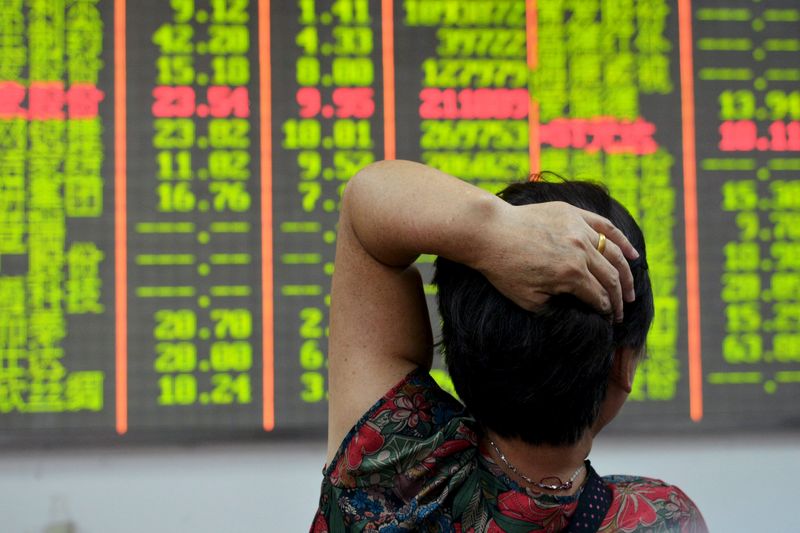By Samuel Shen and Kevin Yao
SHANGHAI/BEIJING (Reuters) - Chinese stock markets tumbled for a second straight day on Wednesday as investors crowded the exits, fearing a government campaign to prop up share prices was faltering and unnerved by a steady stream of gloomy economic news.
The Shanghai and Shenzhen markets were down around 3 percent in morning trade, taking their losses to more than 8 percent since Monday's close, despite a government-directed campaign by brokers, fund managers and regulators to stabilize prices.
The sell-off began late on Tuesday on speculation that the central bank was in no rush to inject more stimulus into the world's second-largest economy, which has been slowing markedly as investment and exports weaken.
On Wednesday, the Commerce Ministry added to those concerns, saying exports could continue falling in coming months, after an 8.3 percent plunge in July, their biggest drop in four months.
Domestic and global investors are growing anxious that China's economy will suffer a hard landing. Their anxiety is only heightened by the prospect of an imminent rise in U.S. interest rates, which would draw capital away from emerging markets like China.
"We advise strapping in for a bumpy ride," said Tim Condon, head of Asia research for ING Bank in Singapore.
The economy is already under threat of deflation and struggling to revive bricks-and-mortar investment. It is officially targeted to grow by 7 percent this year, but some economists estimate it may be growing at closer to half that.
Combined exports and imports for the first seven months of 2015 fell 7.2 percent from the same period last year, compared with Beijing's full-year target of 6 percent growth in total trade.
"The possibility of exports to see year-on-year decline in some months could not be ruled out. But we will still see export growth for the whole year," Commerce Ministry spokesman Shen Danyang told a regular monthly briefing on Wednesday.
"For the whole year, the foreign trade will face more severe situation than we expected."
Only last month, the ministry predicted exports would improve in the second half of this year from the first half.
TESTING BEIJING'S RESOLVE
Investors sold stocks across the board on Wednesday, including in companies partly owned by the China Securities Finance Corp (CSFC), the state margin lender tasked with buying stocks and propping up prices.
The margin-lender is part of a "national team" of Chinese financial institutions assembled by Beijing to prop up prices. The team was formed last month, after a long and stunning rally in Chinese markets ended in panic selling.
An index that tracks companies in which CSFC is a shareholder fell more than 4 percent, revealing doubts about the team's ability to turn market sentiment around.
"The government doesn't have enough money, or willingness to buy shares now," said Samuel Chien, partner of hedge fund manager Shanghai Boom Trend Investment Management Co.
The weak sentiment spread on Wednesday to the foreign exchange market, where the yuan fell away from the official reference rate set by the central bank each morning.
The People's Bank of China (PBOC) devalued the currency on Aug. 11, within a few days of the poor July export data and other official figures showing factory-gate prices continued their three-year slide in July, touching a six-year low.
In an attempt to calm rattled markets, the PBOC later insisted the yuan had no reason to fall further, but most economists believe there is political pressure to let it slowly slide, which will pressure China's export-reliant Asian neighbors.
The yuan has fallen 3 percent against the dollar since the eve of the devaluation, but that marks only a partial reversal of its gains over the past 12 months, especially against currencies of major trading partners Japan and the euro zone.
Bank of America Merrill Lynch (NYSE:BAC) said on Wednesday the yuan could be allowed to depreciate to 6.5 to the dollar by the end of this year and 6.9 by end 2016, from around 6.40 now.
The devaluation last week triggered falls in other Asian currencies such as those of Australia, New Zealand, Indonesia, Singapore and Taiwan, fuelling fears of a currency war.
On Wednesday, Vietnam devalued the dong for the third time this year as authorities sought to support a languid export sector facing fresh challenges from the Chinese devaluation.
